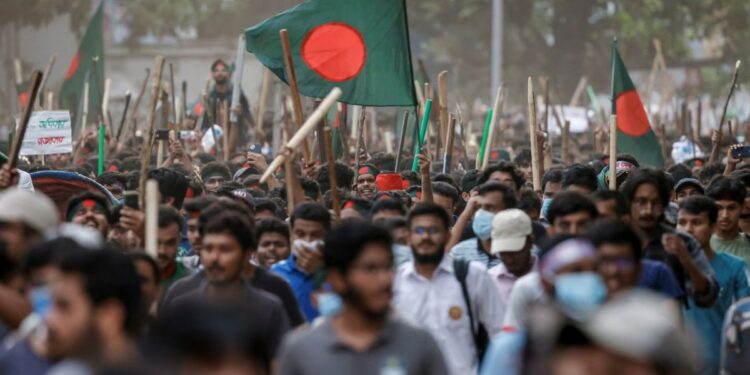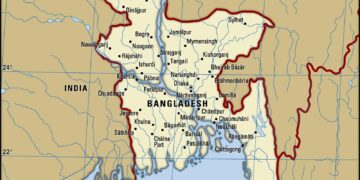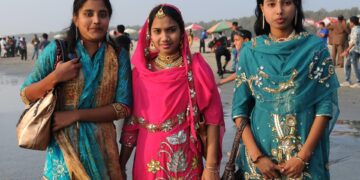- What measures has the government taken to address the escalating violence?
Violent Job Quota Protest in Bangladesh: 6 Dead and Counting, Schools and Colleges Forced to Close
Overview
A violent protest erupted in Bangladesh recently, resulting in the deaths of at least 6 people, with the death toll expected to rise. The protest, which started as a demonstration against job quotas in the country, quickly escalated into a deadly clash between protesters and law enforcement. As a result, schools and colleges across the country have been forced to close, disrupting the education of thousands of students.
Background
The job quota system in Bangladesh has long been a contentious issue. Under this system, a certain percentage of government jobs are reserved for various groups, including women, ethnic minorities, and people with disabilities. However, critics argue that the quota system is unfair and discriminatory, as it often leads to candidates being selected based on their identity rather than merit.
Protesters have been demanding reforms to the job quota system, calling for a more merit-based selection process. The government, on the other hand, has been reluctant to make any changes, citing the need for affirmative action to ensure representation for marginalized groups.
The Protest
What started as a peaceful demonstration soon turned violent as protesters clashed with police and other security forces. The situation quickly spiraled out of control, with reports of vandalism, arson, and even gunfire. As a result of the clashes, at least 6 people have been confirmed dead, including both protesters and law enforcement personnel.
In response to the escalating violence, the government has deployed additional security forces to maintain order. Schools and colleges across the country have been forced to close temporarily to ensure the safety of students and teachers. The closure of educational institutions has disrupted the academic calendar and left many students uncertain about their future.
Impact
- At least 6 people dead, with the death toll expected to rise
- Schools and colleges closed, disrupting the education of thousands of students
- Increased security presence to maintain order
- Growing uncertainty and fear among the general population
What’s Next?
As the situation remains tense, it is unclear what the future holds for Bangladesh. The government has vowed to take action against those responsible for the violence and has promised to address the concerns of the protesters. However, the deep-rooted issues around the job quota system are unlikely to be resolved overnight.
For now, the priority is to restore peace and stability in the country and to ensure the safety of all citizens. It is crucial for all parties involved to engage in dialogue and find a peaceful resolution to the ongoing crisis. Only through cooperation and understanding can Bangladesh move forward and build a brighter future for all its citizens.
| Country | Deaths |
|---|---|
| Bangladesh | 6 (and counting) |
As the situation continues to unfold, it is important for everyone to stay informed and engaged. By working together, we can overcome this crisis and pave the way for a more peaceful and prosperous Bangladesh.
A recent wave of protests in Bangladesh over the quota system in government jobs has resulted in tragedy, with at least six individuals killed and over 100 others injured. The unrest took place in major cities across the country, prompting the closure of schools and colleges.
Reports indicate that two additional deaths occurred in Dhaka and Chattogram, adding to the four reported fatalities from those cities and Rangpur. Among the deceased were three students, with around 400 others sustaining injuries in the violent clashes that erupted in response to calls for quota system reforms.
Authorities have taken measures to address the escalating situation, deploying Border Guard Bangladesh troops in key urban centers and implementing the closure of educational institutions until further notice for the safety of students.
The turmoil has disrupted normal activities in the capital, where incidents of arson and explosive devices have been reported. Various parts of Dhaka have experienced clashes, leading to roadblocks and widespread disruptions.
The origins of the protests can be traced back to advocates seeking changes in the quota system, which they argue hinders the entry of deserving candidates into government positions. The demonstrations intensified after confrontations between student groups affiliated with the ruling party and protestors.
Along with highway blockades and clashes, demonstrators have called for reforming the current system that allocates job quotas based on categories such as war veterans, administrative districts, women, ethnic minorities, and individuals with disabilities.
The recent unrest poses a significant challenge to the government led by Prime Minister Sheikh Hasina, particularly following her re-election earlier this year. Hasina’s remarks on the importance of honoring war veterans have been met with mixed reactions amid the ongoing protests.
While the quota system was temporarily suspended in 2018 following previous student demonstrations, a recent court ruling led to its reinstatement for veterans’ families, reigniting tensions and prompting renewed calls for reform.
International organizations like Amnesty International and the US State Department have expressed concerns over the safety of peaceful protesters and condemned acts of violence. The situation remains fluid, with calls for dialogue and resolution to end the disruptions and restore normalcy in Bangladesh.
Publish Date:
Jul 17, 2024
Explore More














